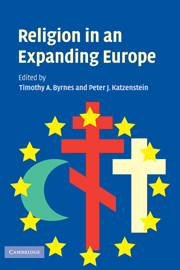1 - Multiple modernities as limits to secular Europeanization?
Published online by Cambridge University Press: 22 September 2009
Summary
The casual reader of current news cannot help but notice the prominence of religious issues in contemporary European politics. In the 1990s hundreds of thousands of refugees from Croatia (Catholic), Serbia (Orthodox), and Bosnia (Muslim) were a painful reminder to all of Europe's religious heterogeneity. Declaration No. 11, appended to the 1997 Treaty of Amsterdam, innocuously proclaimed that the European Union (EU) respects and in no way prejudices national laws governing the status of Churches and religious associations as well as of philosophical and non-confessional organizations. Since then religious issues have become increasingly politicized (Soper and Fetzer, 2002).
In France a bitter debate has raged over the use of headscarves in schools. In Germany a similar political debate is occurring, at a less feverish pitch, with a more prominent role accorded to the Supreme Court. In Spain the Aznar government passed a law strengthening the position of the Catholic Church in public education, despite the public outrage of the opposition (Fuchs, 2003). Anti-Semitism is on the rise among Europe's Muslim population, especially since the beginning of the second Intifada in 2000. The public release of an EU-sponsored report on this subject became a matter of political controversy in the fall of 2003. In Kosovo that threat lingers. And the opening of negotiations between the EU and Turkey about eventual membership leaves religion on Europe's diplomatic agenda, and with it the issue of the compatibility between political Islam and secular Europe.
- Type
- Chapter
- Information
- Religion in an Expanding Europe , pp. 1 - 33Publisher: Cambridge University PressPrint publication year: 2006
- 26
- Cited by

